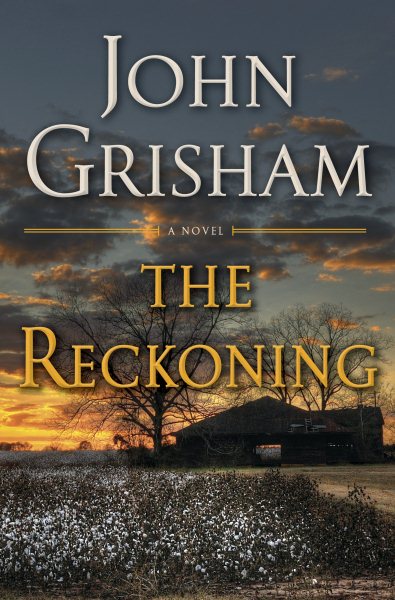By Matthew Guinn. Special to the Clarion-Ledger Sunday print edition (October 21)
At this point in his long and bestselling career, John Grisham’s chief competition is himself. How to top the breakout sensations of A Time to Kill or The Firm? How to set the bar higher than the dozens of blockbusters that have followed? It would appear that Grisham has no mountains yet to climb.
 But in The Reckoning, he seems to have found a new challenge to expand his achievement: to charge right into the territory of the Old Man of Southern literature himself, fellow Mississippian William Faulkner.
But in The Reckoning, he seems to have found a new challenge to expand his achievement: to charge right into the territory of the Old Man of Southern literature himself, fellow Mississippian William Faulkner.
Grisham does so with a novel stuffed with all the elements of Faulknerian tragedy: family secrets, a buried history, illicit sex, race, and bloody retribution. It makes for a heady mix.
Fitting, then, that this ambitious challenge returns Grisham to the Mississippi setting of A Time to Kill and Sycamore Row, fleshing out his fictional Ford County after the manner of Faulkner’s Yoknopatawpha.
The Reckoning opens with an episode that seems inspired by Faulkner’s The Unvanquished. Decorated WWII veteran Pete Banning, home from the Pacific theater, strides into the office of the Methodist minister who’d counseled his wife while he was missing and presumed dead, and shoots him in cold blood. Banning surrenders himself to the police, but is otherwise uncooperative. Under repeated questionings, his response never varies: “I have nothing to say.”
Banning is, for the first hundred pages or so, one of the least sympathetic protagonists conceivable—he is to all appearances a laconic, cold-blooded killer. But Pete’s war service, it is revealed, involves a backstory that belies that facade.
And what a backstory it is. The novel reaches its full pitch in part two, “The Boneyard,” where we learn all that Pete endured through his service in the Pacific. Astutely researched, “The Boneyard” reads like a novella of the Bataan Death March, Japanese prison camps, and guerrilla warfare in the Pacific Theater. We learn that Pete was a true hero, a patriot, and a loyal friend to his comrades at arms. He not only endures the war atrocities of the Japanese, he prevails.
Pete returns stateside to convalesce from his war wounds, stoic and tight-lipped about his imprisonment. But if Pete thought he had escaped a living hell in the Pacific, he finds that back in Ford County another, more domestic hell has been brewing in his absence. Within a few months, he has committed his wife Liza to Whitfield, deeded the family farm to his children, and murdered the Reverend Dexter Bell.
Pete faces execution for his crime and does nothing to aid in his defense. With Pete not talking, it is up to the Banning children and their Aunt Florry to cipher his motives.
Not much else can be told about the story without revealing several major plot twists. Suffice it to say that a buried history of sex and madness emerges—and that Grisham keeps the revelations coming to the last page. The disintegration of the Banning family at times reads like Job’s saga. Several deaths occur and one of them, toward the novel’s conclusion, is among the finest scenes Grisham has written.
Georgia writer Flannery O’Connor once said that Faulkner’s towering presence in Southern literature “makes a great difference in what the writer can and cannot permit himself to do. Nobody wants his mule and wagon stalled on the same track the Dixie Limited is roaring down.” In The Reckoning, Grisham’s engagement with the Dixie Limited is as inspiring as it is bold. That engagement has produced a page-turner of literary caliber not often seen at the top of bestseller lists.
The Reckoning has also expanded the scope of what we can expect of the Grisham novels to come. One hopes that this most prominent of living Mississippi writers will continue to explore Ford County and demonstrate that the tropes of family, community, and history are still fertile ground.
“Hearing the truth is like grabbing smoke in our family,” one of the Banning children says toward the end of the novel. In The Reckoning, Grisham has not only grabbed smoke, but bottled it. What a pleasure it is to see him expand the “postage stamp” of his fictional soil.
Novelist Matthew Guinn is associate professor of creative writing at Belhaven University.
John Grisham’s The Reckoning is one of Lemuria’s November 2018 selections for its First Editions Club for Fiction. Signed first editions are available here.


Comments are closed.